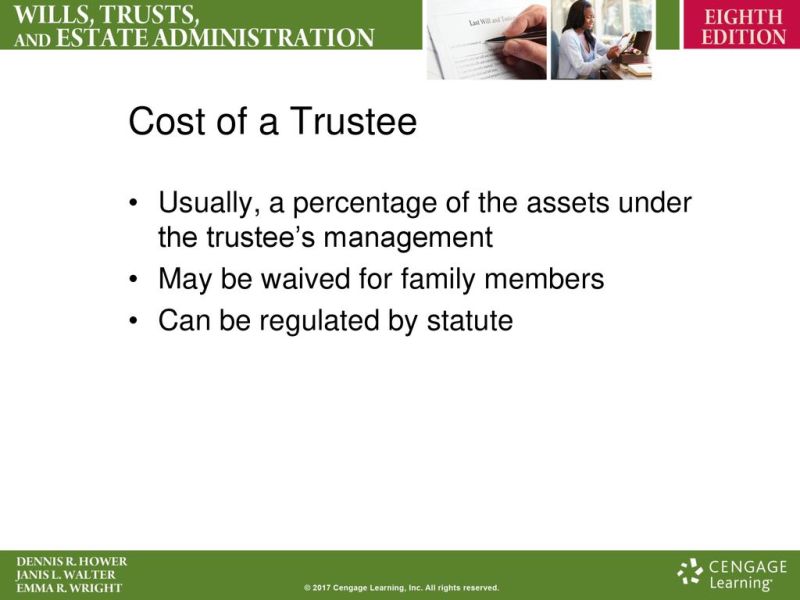Insurance Trustee Meaning – The trustee is a person or firmly holds ownership of the property or other assets of the trust and is managed according to the will of the trust creator.
Trustees may be assigned for different purposes, such as trusts managed by the provider after the grantee is granted (and the administration of retirement plans for minors).
Insurance Trustee Meaning

The trustee is truly responsible for the beneficiary or beneficiary of the beneficiary. This means that the trustee must have the best interests of the beneficiary when managing the trust property.
Crown Global Life Insurance Ltd.
A trustee is an individual or organization designated by the trust grantor (or trust) and owns legal ownership of the trust assets.
The trustee grants ownership of this law through a trust document. A person or entity benefiting from trust is called a beneficiary.
Trust is a legal entity created by the provider. It owns some assets that the grantor has relocated. Once the grantor dies and indicates how to deal with it, the trust document can provide the title of trustee for the asset or property to teach.
For example, trust can be made to provide legal protection for the granted property and to ensure distributions are made under the terms of trust granted after death. The trustee is accused of ensuring that the grantor’s preferences are met.
Introduction To Trusts
The trustee is responsible for the correct handling of all property and other assets in the trust to the beneficiary.
The specific duties of the trustee are unique in the trust agreement and depend on the type of assets held in the trust.
For example, if the trust holds various leased properties intended for income, the role of the trustee is to ensure property maintenance, maintenance and income.

If the trustee consists of other investments, such as stocks in the broker’s account, the internal account needs to be processed and processed.
Meaning And Definition Of Insurance
Trustees have the obligation of a true beneficiary of trust, which means that trustees are asked to reject personal interests, beliefs and prejudice in order to do what is best for them.
All providers have general instructions, regardless of the definition details, and are subject to compliance and responsibility. Providers usually consider the following responsibilities:
If you choose a trustee, you can choose someone you know. However, it is more likely to find someone with experience.
For example, if trust includes property designed to provide for future generations of your family, you want to teach someone who has gained income again.
Will Vs. Trust: What’s The Difference?
The executor manages and is responsible for the case where one person dies and the heirs’ assets are allocated through a will.
Like a trustee, law enforcement can be a trust company, a bank, a reliable friend or a family member.
Choosing a trustee can be one of the most challenging features to make faith. It’s hard to know which person or entity is the most confusing you want. Here are some considerations for choosing a trustee:

The handling of wealth and trust trusts includes financial, attorney and accountant, and guidance letter trust.
❇️ Hsc Sp Last Minute Decision ❇️ Bookmark It For Your Future Reference ↗️🔖 Do Share With Your Friends Who Are Giving Hsc Board Exam 👍✓ Jai Mahavir Commerce Classes #jmcc #palghar #
Your confidence can pay whatever they can pay. You can make you realize that your property is in the hands of the person in the best interests of the beneficiary.
You can choose a reliable friend or family member, but you need to make sure they are responsible for managing your trust.
Furthermore, if family members manage large amounts of money without giving demand, they need irons to succeed in drama and resentment.
This person should be willing and able to continue to work as much as trust. Finally, if something happens to the main trustee, you need to consider and teach alternatives.
Free Printable Living Trust Templates [pdf] Irrevocable
Trust trust can also be a good choice for trustees. They are familiar with the rules of trust in your situation and become trustworthy.
However, if one of your intentions as a grantor is to increase wealth in the room, then an attorney may not have the proper ability to invest or know how to manage wealth.
The trustee is responsible for the trust based on the grantor of the trust document. They have to communicate with the beneficiaries, spend investments, make payments based on instructions, and so on.

It is the responsibility of the trustee to ensure that the property of the grantor is governed and distributed according to the grantor. The trustee has a covenant obligation to act in the best interests of the beneficiary rather than his own.
Irrevocable Trusts Explained: How They Work, Types, And Uses
The trustee must rule the trust in the teaching of each grantor, be loyal to the beneficiary and deal with the beneficiary.
The Trustee is a liability to relieve the trust assets of the trust beneficiaries.
All states have laws responsible for the trust and how it should be managed. It is important for the person you are taught to understand trust and work.
If you don’t know someone who provides a provider, you’ll find companies in companies that deal with wealth, banking and trust management companies.
The Complete Guide To Henson Trusts In Ontario
Writers are asked to use major resources to support their work. It includes white papers, government data, original reports, and interviews with industry experts. We also properly discuss the original research by other well-known publishers. You will find more information on the patterns we follow in the Edit Policy.
The offers seen on this form come from the associations that receive payments. This fee may affect how and where the list appears. All offers available on the market are not included.
Before becoming a Canadian who can do what Canadians do to do to carry out the execution of the estate, understand the special needs and benefits of trust and its interests, and how it does it?

When to Distribute – When to Delay Family 6 Key Alternative Investments to Think About the Progress of Your Married Love: What Your Future Money Means: What Does Your Future Related to Your Wedding Money? Complex legacy plan: how you will to keep moving forward, how much you can pay for Alaskin’s trust. Identify their differences, responsibilities, and how to effectively build and handle trust.
5 Things To Consider When Drafting A Revocable Living Trust
If it is part of the land planning, it is important to understand the differences between trustees. Let’s break this simple:
A reliable set of rules, and the trustees follow them. This arrangement ensures that your merchandise is processed and distributed according to your choice, even if you can’t make it yourself.
Why is this what? Trusts will help you avoid attempts, protect privacy, and give you more control over how assets are processed after death. This is an important tool for any comprehensive land.
At its core, a trust is a legal arrangement in which a party known as a reliable (or grantor) moves the property of a party to the host to manage the interests of a third-party beneficiary.
Debenture Trustee & Portfolio Managers
While names may be confusing, their roles are different. The trust sets up trust and condemns its terms, and the trustee is responsible for the assets under these terms. This setting can help ensure that the desire for trust is followed, even if they can no longer block their property.
Imagine a grandmother trying to make sure her grandchildren will receive her home without delaying probate and public inspections. He settled his convertible confidence and named himself the first provider, and his daughter was the heir to the trustee. At his death, his daughter will manage the trust and share the grandson’s house as her grandmother wishes.
This setting not only helps with the transfer process, it also stores private details and provides clear instructions on how to handle the assets.

Understanding these foundations lays the foundation for a deeper role in the development trust. Next, let’s examine the differences between trustees and trustees and why these roles are important for effectively managing the trust.
Beneficiary Of Life Insurance
Any confidence should be understood in three important roles: reliable, provider and beneficiary. Everyone has unique responsibilities and functions that ensure the smooth progress of trust.
Trust is the person or entity that builds trust. They are also called “grantors” or Skundlor. The main trust responsibilities of trust include:
Trusts can also serve as providers, but they must teach












